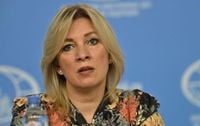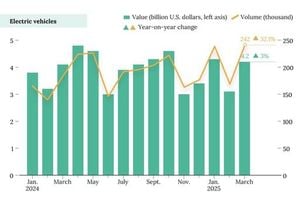Russia has issued a stern warning to Germany regarding the potential transfer of Taurus missiles to Ukraine, expressing that it would view any use of these missiles against Russian territory as Germany's direct involvement in the ongoing conflict. This statement was made by Russian Foreign Ministry spokeswoman Maria Zakharova during a recent briefing, highlighting the escalating tensions surrounding military support for Ukraine.
Zakharova emphasized that Russia would interpret any strike by Taurus missiles on Russian targets as participation by Germany in the war against Ukraine, which would carry significant consequences for Berlin. Her remarks were triggered by comments from Germany’s future chancellor, Friedrich Merz, who suggested that the Taurus missiles could be utilized to target the strategically significant Crimean Bridge.
Merz, who is set to take office in early May 2025, has indicated his readiness to support the transfer of Taurus cruise missiles to Ukraine. This marks a notable shift from the stance of outgoing Chancellor Olaf Scholz, who had previously opposed such a transfer. Military expert Ivan Stupak noted that various factors could influence the decision on the number of missiles and their operational range.
Meanwhile, Matthias Miersch, General Secretary of Germany’s Social Democratic Party, expressed skepticism about Merz's commitment, suggesting that he might ultimately backtrack on supplying Ukraine with Taurus missiles once he reviews classified information related to the situation.
Across the Channel, the United Kingdom has voiced its support for Germany’s potential missile transfer to Ukraine. According to reports from The Telegraph, the UK is prepared to back any decision made by Berlin, although the final call remains with German officials, who are still in discussions.
A UK source stated, "We continue to work with our partners, including Germany, to equip Ukraine as best we can to defend its sovereign territory." This statement underscores the UK's commitment to bolstering Ukraine's defenses, especially as the Taurus missiles are recognized as a powerful system capable of striking deep within Russian territory.
The UK's backing comes amidst frustrations over Germany's previous refusal to deliver Taurus missiles under Scholz’s leadership, a decision that has been a point of contention among European allies. Both the UK and France have already provided long-range missile support to Ukraine, including Britain’s Storm Shadow and France’s SCALP systems.
Earlier this week, Merz reiterated his support for the delivery of Taurus missiles during a televised interview, stating, "I have always said that I would do this, but only in coordination with European partners." This sentiment reflects a broader desire among European nations to present a united front in military support for Ukraine.
The Taurus KEPD-350 missile, which has been in service with Germany since 2006, boasts an impressive range exceeding 500 kilometers (300 miles) and incorporates advanced stealth technology. Its dual-stage 480-kilogram (1,100-pound) warhead is designed for penetrating fortified targets, making it a formidable addition to Ukraine’s military arsenal.
On April 16, 2025, a British official reiterated the UK's long-standing support for the transfer of Taurus missiles, emphasizing that a decision by Germany to proceed would be welcomed. This support is seen as crucial in influencing the discussions within Germany, especially as the new coalition government under Merz navigates its security policies.
Roderich Kiesewetter, a senior MP in Merz's Christian Democrats (CDU) party, acknowledged that while talks about the Taurus missile transfer are ongoing, there is currently no consensus. He noted, "I do not yet see any consensus here, especially as the parties have not agreed on the key security policy issues in the coalition agreement." However, he added that any endorsement from the UK could significantly impact Germany's decision-making process.
The situation surrounding the potential transfer of Taurus missiles illustrates the complexities of international military support for Ukraine. As Russia continues to express its displeasure over Western military assistance, the dynamics within Germany and its relationships with allies like the UK and France play a critical role in shaping the future of military aid to Ukraine.
In summary, the discussions surrounding the Taurus missile transfer highlight the intricate balance of power and diplomacy at play in Europe. As new leadership emerges in Germany, the decisions made in the coming weeks will not only affect Ukraine's defense capabilities but also the broader geopolitical landscape in the region.






